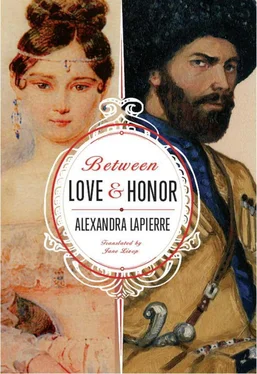Negotiate now. Jamal Eddin’s words echoed the past. Negotiate now, right away, when the invaders are busy elsewhere and in a difficult position themselves. Negotiate with them now, when they’re still clamoring for negotiations.
Afterward, it will be too late.
The siege of Sebastopol was over. Yes, the Russians had lost the war against the Europeans. But they had learned a great deal from their contact with modern and powerful troops. And now they would be free to concentrate on another front.
Prince Bariatinsky, the new commander-in-chief of the Armies of the Caucasus, was a personal friend of Alexander II. He would have every means at his disposal to bring this conflict to a positive end. And he was of an entirely different mettle than Grabbe and most of his predecessors.
Jamal Eddin emphasized that the situation was urgent. If he negotiated today, his father could still obtain the essential conditions he desired: religious freedom and possession of the land. As for the rest, he should let it go.
It was said that his words broke Shamil’s heart.
They wounded him to the core, and then they sent him into a mad rage.
His son was an agent, in the pay of the infidels!
The giaours’ henchman!
This is what his son had become? A hypocrite? A traitor?
This was probably the only reason the Russians had agreed to send him back to the Caucasus—to spy, to lead them astray, to corrupt his own people!
Wasn’t that the objective of the Great White Czar’s entire plan? Wasn’t that why he had kidnapped his son, kept him, and educated him?
He had succeeded in turning the son against the father, in alienating his child and defiling him.
Profoundly hurt, disappointed by his efforts, his love betrayed, Shamil suffered anew because of Jamal Eddin.
He began to avoid spending time with his son and soon became suspicious of his influence.
When young Mohammed Sheffi, fascinated by his older brother, also began to speak of the necessity of peace, their father’s wrath knew no limits.
Fearing contagion, the imam took away every vestige of Jamal Eddin’s Russian past, every impure object he had brought with him from the land of the infidels. He had thought it would be possible to let his son live as he liked here in the mountains. He had been wrong.
Shamil burned his books, his novels, his poetry, his maps, and his works of grammar. He burned the instruments he used to study physics, his sheet music, and his painting supplies.
The imam invited his son to concentrate on reading the Koran, exploring Sheik al-Buhari’s Book of Hadiths , and learning Arabic. He asked him to take instruction with the mullahs Shamil had chosen and not to leave the madrassa until his masters deemed him worthy and ready. He gave his son extensive access to his own library, which was replete with the knowledgeable works of his own masters and precious manuscripts that he himself had collected.
In Tiflis, it was rumored that Shamil wanted Jamal Eddin to marry. He had chosen for him the daughter of the naïb Talguike. She was said to be young, beautiful, and submissive. His purpose, no doubt, was to make his son an integral part of the life of his people and the future of Dagestan.
But Jamal Eddin said that he did not love the woman who had been chosen for him and that he would not live with her. He publicly refused to live under the same roof with his wife or even to touch her.
Infuriated at his son’s recalcitrance, which not only insulted the young woman’s family but humiliated him by flatly disobeying his orders, Shamil turned cruel.
His heart was already broken. Now it filled with hatred.
He had Jamal Eddin arrested and exiled to the fief of Mohammed Ghazi, at Karata.
So the eldest son became the captive of his younger brother.
Mohammed Ghazi was no torturer. He did not throw his prisoner into the bottom of a pit or mistreat him.
But he professed thorough contempt for what Jamal Eddin had become—a Russian.
Mohammed Ghazi, the horseman in white, was pure and sincere.
He was appalled by everything about Jamal Eddin—his tastes, his instincts, and his habits.
Jamal Eddin’s discourse was identical to that of the sellouts of Ghimri, Untsukul, and Arakhanee. Because of their cowardice or their own interests or for money, they let themselves be corrupted by the infidels and allowed their own brothers to be massacred.
He hated Jamal Eddin.
How could he not?
Other things contributed to Mohammed Ghazi’s insurmountable antipathy for his brother.
Hadn’t Jamal Eddin deserted their camp for sixteen years? And yet, because he was the eldest, he remained the true successor to the imam, the legitimate heir.
At least, that’s what the hypocrites and those who favored peace negotiations began to think—and to say.
After Jamal Eddin tried to escape from Karata a third time, Shamil exiled him to an even more remote place, farther up the mountain.
Farther from the inhabited auls.
And farther, most importantly, from the Russian lines.
Robbed of his books, completely helpless and isolated, Jamal Eddin fell ill. At least that was the rumor that was going around Tiflis.
In the forts along the line, it was said that he had caught cold in the glacial solitude of the high mountains where he had been banished and that the cold had rapidly degenerated into pneumonia. But no one really knew the actual causes of his illness nor its symptoms.
The murids spread the rumor that the giaours had poisoned him before turning him over to them.
For several months, there was no news of Jamal Eddin’s condition.
Baron Nicholas’s headquarters, Prince Orbeliani, and Prince Chavchavadze hounded their spies for information about the imam’s son. None was forthcoming.
On February 15, 1858, three years after the exchange ceremony, a Montagnard bearing a white flag rode down from Dargo-Veden, the aul where Shamil lived, and presented himself at Fort Khassav-Yurt. He carried a message from the imam asking for medicine for his son, Jamal Eddin.
The commander took in the significance of such a gesture.
Shamil’s willingness to lower himself to beg for assistance from the infidels was an extraordinary indication of his love for Jamal Eddin.
This humiliating request had obviously come from the young man and spoke volumes about the imam’s distress. It was an admission before all, the Russians and his own people, that he had never ceased to love his child. It proved to Jamal Eddin the immensity of his affection.
The commander did not miss the chance to accept the hand that reached out to him. He immediately told the messenger he would do all he could.
He called in his own personal physician, who listened to the description, such as it was, of the patient’s symptoms and provided a few vials of medicine that might correspond to the illness.
The commander sent word to the imam that if his son needed medical attention, he was ready to send a doctor.
Four months later, on June 10, 1858, the same messenger returned to Khassav-Yurt. The imam asked whether the doctor the commander had mentioned in February could visit Jamal Eddin.
The commander sent Doctor Piotrovsky in exchange for an amanat.
Shamil had foreseen this possibility and had sent five of his naïbs, five murids who were waiting in the woods. They were his offering as hostages.
The commander retained three.
Doctor Piotrovsky set out from Khassav-Yurt the following morning.
Jamal Eddin lived in the small, extremely remote village of Soul-Kadi, near the source of the Andi Koysu. Even the Montagnards considered it virtually inaccessible.
The doctor’s journey took over four days and was, as he described it, a harrowing experience. He descended into chasms on trails whose stones slipped and crumbled beneath his feet and experienced nearly six hours of vertigo on precipices that, looking down, offered a sheer drop and, looking up, offered no path at all. Worse still, Shamil’s own messenger and their guide had to hide them from the local inhabitants, who would have massacred all three of them had they discovered a Russian in their mountains.
Читать дальше












